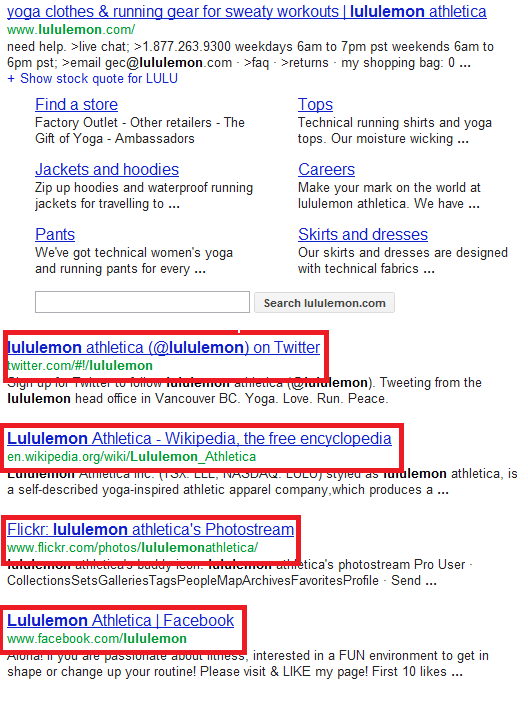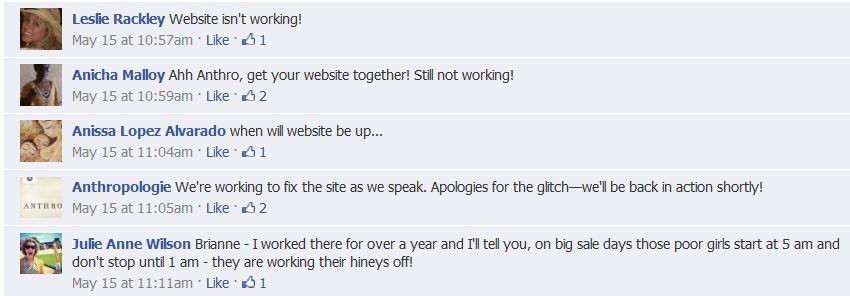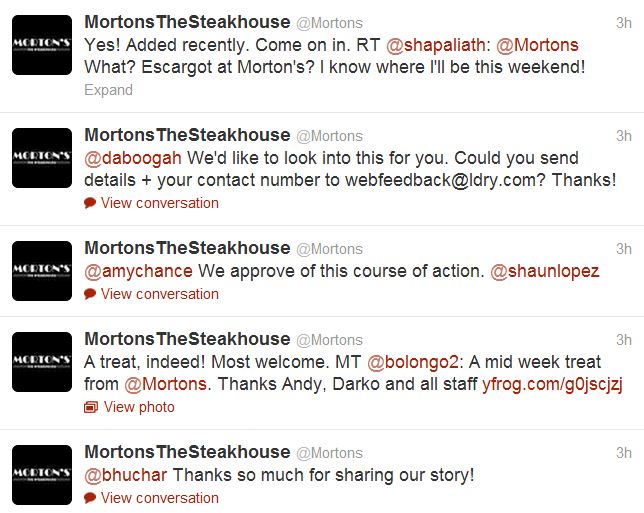 Are you managing your online reputation?
Are you managing your online reputation?
Reputation can affect purchase decisions and influence the growth or decline of a business.
Many businesses are using social media to develop online reputations, manage and respond during a crisis and monitor the conversation to prevent future crises.
Try searching your company and product names to make an assessment of your online reputation. What do you see in the top 10 search results?
What follows are three tips to help you manage your reputation with social media.
#1: Establish Your Online Reputation
When someone Googles your brand name, your business should be sitting right there on the first page waiting for the user. And yourbrandname.com shouldn't be the only branded search result.
Twitter, Facebook, LinkedIn and other social brand pages should assist in owning the first search engine results page. Especially if you have a common name, owning your brand name search queries is important for users to find the right information.
Social media can help you create a stronger online presence, so old news doesn't turn up at the top of search results. If you don't control your brand, someone else may post inaccurate or derogatory information that could tarnish your reputation.
Take a look at the search results from Lululemon. The first result is for their website, but the next four listings are all social media channels that they own or have the ability to edit and monitor.

According to a click-through rate study published by Slingshot at the end of last year, the number-one ranking on Google gets about an 18% click-through rate and the number-two organic listing gets about 10%. Regardless of the actual percentage, the data proves that the first search engine results page is the most important for your brand's reputation.
The reason you want to control several of your first page search results is if a crisis strikes and you have set up several social channels, your brand will have plenty of platforms ranking well to disseminate your message.
These branded channels help push down negative or competitor results that you don't want representing your brand.
Creating social media profiles has given people the channels to voice their joys and complaints about your company. Owning your social media profiles can help you better control and manage the conversation, so you can respond in a timely manner.
If you aren't marketing with social media, those conversations are going to happen on other channels that may prohibit you from getting involved in the conversation.
Get World-Class Marketing Training — All Year Long!
Are you facing doubt, uncertainty, or overwhelm? The Social Media Marketing Society can help.
Each month, you’ll receive training from trusted marketing experts, covering everything from AI to organic social marketing. When you join, you’ll also get immediate access to:
- A library of 100+ marketing trainings
- A community of like-minded marketers
- Monthly online community meetups
- Relevant news and trends updates
#2: Control Responses During a Crisis
A crisis for a company can range from unexpected website issues to a lawsuit. How a crisis is handled online makes a huge difference to the future ramifications. It's important to monitor and respond to customers who write on your wall or send you messages to resolve any issues and let users know they're heard.
Facebook was one of the channels Anthropologie used for announcing a huge online sale in May. Right after they posted about the event, the site went down for maintenance. It didn't take long for Facebook users to complain and point out that they couldn't get to the site to buy any products.
The social media team did not respond to every comment personally, but was smart to send out a note to fans that they were working on the issue and the site would be back up soon.

Discover Proven Marketing Strategies and Tips
Want to go even deeper with your marketing? Check out the Social Media Marketing Podcast! Publishing weekly since 2012, the Social Media Marketing Podcast helps you navigate the constantly changing marketing jungle, with expert interviews from marketing pros.
But don’t let the name fool you. This show is about a lot more than just social media marketing. With over 600 episodes and millions of downloads each year, this show has been a trusted source for marketers for well over a decade.

When the site was back up, a user still couldn't access the page, so the social team provided a direct email contact to resolve the issue off of Facebook. Providing an email was a good solution because it gave the user somewhere to go to have her issue addressed.
If you can't solve a user's problem with a simple post, take the issue offline and out of the public eye as soon as possible.

Sometimes brand ambassadors will even step in to resolve a conflict for you. Though it is helpful when customers support you enough to calm a disgruntled customer, do not assume that will be the case every time. Set up tools and a strategy to monitor the conversation, so you aren't surprised with the conversations happening about your brand.
#3: Monitor Conversations
Now that you've created and are updating several social profiles on behalf of your brand, you may find it a bit overwhelming to keep up to date with what is being said about your brand online.
Savvy businesses are monitoring their brand for mentions with social media monitoring tools.
“Social media monitoring tools are the first line of defense when managing your online reputation,” explains Andy Beal, CEO and founder of Trackur. “Monitoring tools allow you to quickly fan the flames of any praise or fight reputation fires while they are still manageable.”
Before a negative review goes viral or enters the top 10 search results for your brand name, wouldn't it be helpful to respond and solve the problem or take the issue offline to address?
Social media monitoring tools range from free to more advanced enterprise-level to tools that only monitor certain platforms. Although online monitoring tools capture a vast amount of mentions on the web, no tool can capture every mention due to privacy policy settings.
Here are a few tools worth checking out:
- Google Alerts is a free tool that monitors all sites that Google can index with options to be notified as it happens or weekly.
- Trackur is an affordable tracking tool that monitors several social channels, as well as forums and news sites.
- Social Mention is a free tool that monitors over 70 social media properties. (Editor's Note: Social Mention is no longer an active online tool.)
There are several Twitter-specific monitoring apps, like Seesmic and HootSuite, as well.
Social media is real-time, so the faster your brand responds, the better your customer service will appear.
While people have the right to voice their complaints, it's up to you to remedy the situation and turn negative comments into positive opportunities. Since social media is public, your quality customer service will be seen by other users and may influence their purchase decisions.
One company that monitors their brand name very well, especially on Twitter, is Morton's Steakhouse. Taking a quick look at their Twitter page shows that they respond to many online mentions and try to provide the best customer service they can.

People love to feel like they are being heard and mentions of a brand are invited opportunities for a company to respond.
What Are Your Experiences?
What do you think? Do you own a business and use social media to provide customer service and news about your company? Are you a customer who has had a positive or negative experience with a company and voiced that experience online? Did the company respond? Share your experiences in the comments box below!
Attention Agency Owners, Brand Marketers, and Consultants

Introducing the Marketing Agency Show–our newest podcast designed to explore the struggles of agency marketers.
Join show host and agency owner, Brooke Sellas, as she interviews agency marketers and digs deep into their biggest challenges. Explore topics like navigating rough economic times, leveraging AI, service diversification, client acquisition, and much more.
Just pull up your favorite podcast app, search for Marketing Agency Show and start listening. Or click the button below for more information.

